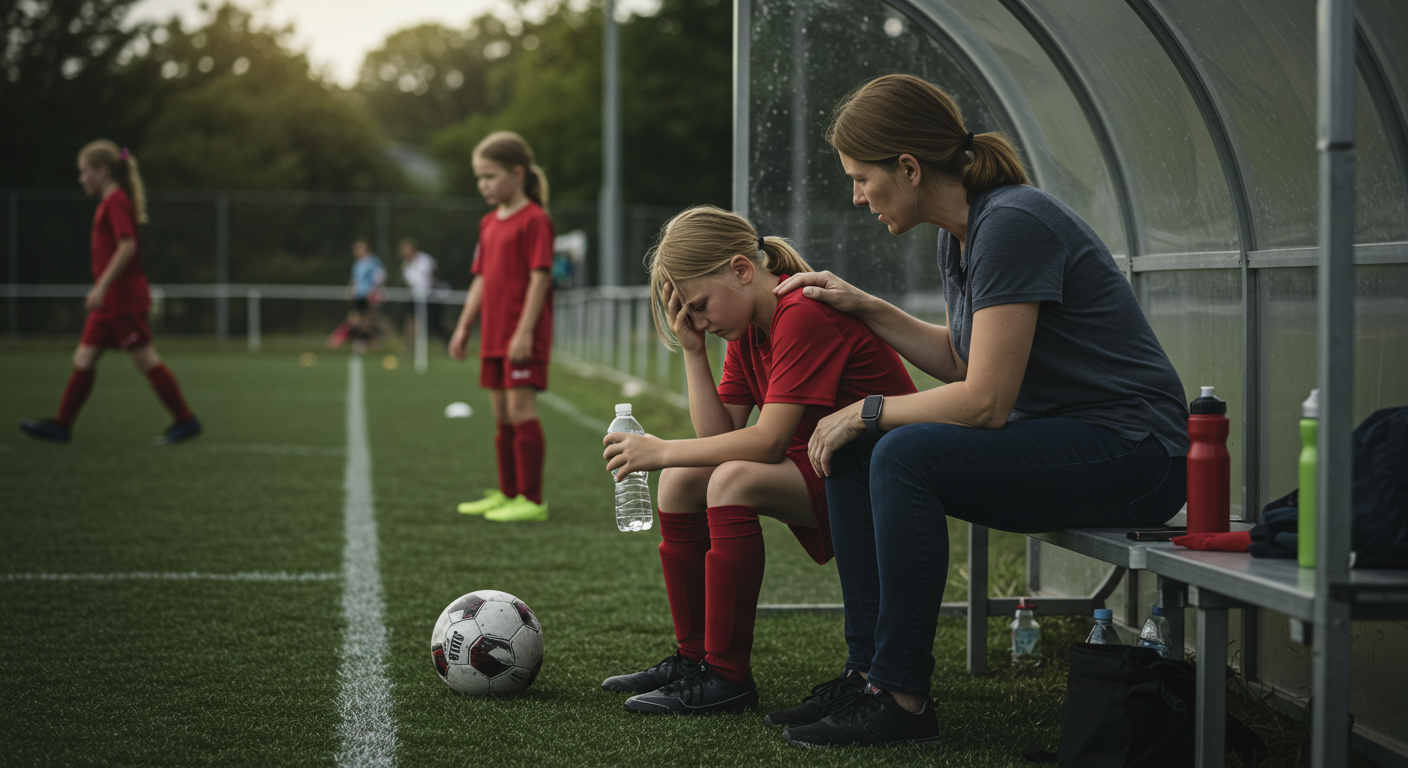Welcome to the Brain & Faith Blog
This is where neuroscience and Scripture meet to bring clarity, calm, and confidence into everyday life. From brain health tips and faith-based practices to practical support for parents of young athletes, you’ll find simple, actionable steps to strengthen your mind, nurture your spirit, and guide your family toward lasting peace and resilience.

How to Help Your Child Handle Sports-Related Stress and Pressure
The Hidden Crisis in Youth Sports
Your 10-year-old used to beg you to take him to soccer practice. Now he complains of stomachaches every Tuesday morning. Your daughter who once lit up talking about basketball now goes quiet when you ask about her game. Sound familiar?
You're witnessing the youth sports stress epidemic firsthand. Recent studies show that young athletes are more anxious than ever before. What started as fun and games has become a pressure cooker of expectations, performance anxiety, and overwhelming stress.
The statistics are sobering. We're seeing record levels of anxiety and depression among young people, with sports-related stress playing a significant role. Parents who enrolled their children in athletics to build confidence and teach teamwork are instead watching their kids lose the joy that made sports worthwhile in the first place.
But here's what you need to know: this isn't inevitable. There are concrete steps you can take right now to help your child rediscover their love for their sport while building resilience that will serve them for life.
What Sports Stress Actually Looks Like
Sports stress isn't just pre-game butterflies. Those nerves can actually help performance. The problem starts when stress becomes overwhelming and destructive instead of motivating.
Healthy stress might show up as excitement before a big game or determination to improve after a tough practice. Destructive stress looks completely different. It shows up as panic attacks in the car on the way to practice. It's your child lying awake at night replaying mistakes. It's tears over minor errors that used to roll off their back.
The sources are everywhere. Performance expectations top the list, whether they come from coaches demanding perfection, parents hoping for scholarships, or your child's own internalized pressure to succeed. Social media makes it worse by creating permanent records of both successes and failures.
Modern youth sports culture has intensified these pressures dramatically. Year-round training eliminates natural recovery periods. Travel teams and expensive equipment make every game feel high-stakes. Early specialization puts enormous pressure on children who should still be exploring different activities.
Age matters too. Younger children (ages 6-10) typically stress about pleasing adults, so their anxiety often mirrors what they sense from parents and coaches. Pre-teens (ages 11-13) become more aware of peer comparisons and may develop perfectionist tendencies. Teenagers face the added pressure of potential college recruitment, making every performance feel like it could impact their future.
The Warning Signs You Can't Ignore
Your child's body will tell you when stress has crossed the line from helpful to harmful. Physical symptoms often appear first, before children can articulate their emotional struggles.
Watch for headaches and stomachaches that mysteriously appear before practices or games, especially when medical exams reveal no underlying cause. Sleep disturbances are another red flag. This includes difficulty falling asleep due to racing thoughts about upcoming competitions or frequent nightmares about sports scenarios.
Changes in appetite often accompany sports stress. Some children lose interest in food entirely while others overeat as a coping mechanism. You might notice your child getting sick more often, as chronic stress suppresses the immune system.
Emotional indicators can be even more telling. Watch for significant shifts in your child's baseline personality. An usually cheerful child becoming consistently irritable, or an outgoing athlete withdrawing from family interactions. Increased emotional volatility, where small setbacks trigger disproportionate reactions, suggests that your child's emotional reserves are depleted.
Perhaps most concerning is when children lose their natural enthusiasm for their sport. If your child who once begged to go to practice now makes excuses to avoid it, or if they no longer talk excitedly about their sport, these are clear warning signs.
Behavioral changes provide the clearest picture. Social withdrawal from teammates, friends, or family members suggests that stress is affecting relationships. Academic performance may suffer as sports stress spills over into other areas of life. Some children may exhibit regressive behaviors, acting younger than their age when overwhelmed.
The key is recognizing patterns rather than isolated incidents. Every child will have bad days, but when multiple warning signs persist over weeks or months, it's time to intervene.
Your Action Plan: What Actually Works
The foundation of helping your child manage sports stress lies in creating safety. They need to know they can express their struggles without fear of judgment or disappointment.
Start with how you communicate. When your child expresses frustration about their performance, resist the urge to say "you did fine" or "it's not that important." Instead, validate their feelings. Try responses like "It sounds like you're really disappointed with how that went" or "I can see this is weighing on you."
Create regular opportunities for these conversations. Many children won't spontaneously share their sports stress, especially if they sense their parents are heavily invested in their athletic success. Establish routine check-ins during car rides or bedtime conversations. Ask open-ended questions about how they're feeling about their sport overall, not just their latest game.
Your own emotional regulation significantly impacts your child's stress levels. Children are remarkably attuned to parental anxiety, and your pre-game nerves can amplify their own. Develop your own stress management techniques. Deep breathing exercises, positive self-talk, or brief moments of prayer can help you model calm confidence for your child.
Teach practical coping skills that give children tools they can use independently. Simple breathing techniques work well. Try the "4-7-8" method: inhale for 4 counts, hold for 7, exhale for 8. Progressive muscle relaxation, where children systematically tense and release different muscle groups, can address physical stress symptoms.
Help them develop positive self-talk strategies. Instead of "I always mess up," they can learn to think "I'm learning and improving." This kind of mental training builds resilience that extends far beyond sports.
The relationship with coaches and team environment plays a crucial role. While you shouldn't micromanage coaching decisions, you can advocate for your child when necessary. If a coach's communication style is consistently harsh or if team culture promotes unhealthy competition among teammates, these conversations may be necessary. Approach these situations as collaborative problem-solving rather than confrontational complaints.
Recognize when professional help might be beneficial. If your child's sports stress is significantly impacting their sleep, academic performance, or overall well-being despite your support efforts, consider consulting with a sports psychologist or child therapist who specializes in athletic performance.
Building Resilience That Lasts
The goal isn't to eliminate all stress from your child's athletic experience. It's to help them develop resilience to handle challenges effectively. This begins with fundamentally shifting focus from outcomes to effort and improvement.
Instead of celebrating only wins or perfect performances, consistently acknowledge your child's hard work, strategic thinking, and sportsmanship. Comments like "I noticed how you kept trying even when you were frustrated" or "Your teamwork really improved this season" reinforce values that will serve them throughout life.
Develop a growth mindset in your child. This is the belief that abilities can be developed through dedication and hard work. When children believe that their current performance level isn't fixed, setbacks become learning opportunities rather than evidence of inadequacy. Help your child reframe challenges by asking questions like "What did you learn from that experience?" or "How do you think you could approach that differently next time?"
Maintain perspective on sports' role in your child's overall development. Regularly discuss and celebrate your child's non-athletic achievements and interests. Ensure that your family conversations aren't dominated by sports talk, and that your child's identity isn't solely tied to their athletic performance. Children who have diverse interests and sources of self-worth are more resilient when facing sports-related challenges.
Create positive sports experiences intentionally. Seek out coaches and programs that prioritize player development over winning at all costs. Support team activities that build camaraderie rather than internal competition. Celebrate teammates' successes and model good sportsmanship in your own reactions to games and competitions.
Remember that character development often happens through challenge, not despite it. When we trust that growth comes through both success and struggle, we can help our children see their athletic journey as part of a larger story of becoming who they're meant to be.
The Practical Steps You Can Take Today
Start by doing a body scan before each game or practice. Check your own shoulders, jaw, hands, and breathing. Are you carrying tension anywhere? Make a conscious effort to relax these areas and establish a calm baseline before your child even begins playing.
Choose a specific posture that communicates support and practice maintaining it throughout the game. This might be sitting with your hands relaxed in your lap, standing with your arms at your sides, or leaning back slightly to appear more relaxed.
Develop a pre-game routine that helps you get into the right mindset. This might include deep breathing exercises, positive visualization, or simply reminding yourself that your job is to enjoy watching your child play, not to evaluate their performance.
Create a signal system with your spouse or other parents who can gently alert you when your body language is communicating something you don't intend. Sometimes we need external feedback to become aware of our unconscious habits.
After games, give your child space to decompress before discussing their experience. Ask questions like "How did that feel?" or "What did you think about the game?" rather than providing your own assessment immediately.
Your Long-Term Impact
The habits you develop now will influence your child's relationship with sports, competition, and challenge for years to come. Children who grow up with parents who communicate calm confidence and unconditional support develop greater resilience, self-confidence, and intrinsic motivation.
Your child is learning how to handle pressure, setbacks, and success by watching you. When you model calm confidence and emotional regulation, you're giving them tools they'll use long after their athletic career ends.
The most powerful support you can offer often happens without words. Your presence, your calm confidence, and your unwavering belief in their worth regardless of performance speaks louder than any pep talk.
Remember that your role as a sports parent is primarily to provide unconditional love and support. When children know they're valued for who they are rather than what they achieve, they're free to take the healthy risks necessary for growth and improvement.
Your child's relationship with sports and with challenge in general is still being formed. By approaching their stress with empathy, practical support, and long-term perspective, you're helping them build a foundation for lifelong resilience and joy in whatever they pursue.
Brain Health Matters, LLC
Helping busy minds find peace through faith and neuroscience.
© 2025 Brain Health Matters, LLC. All rights reserved.
Terms & Conditions

